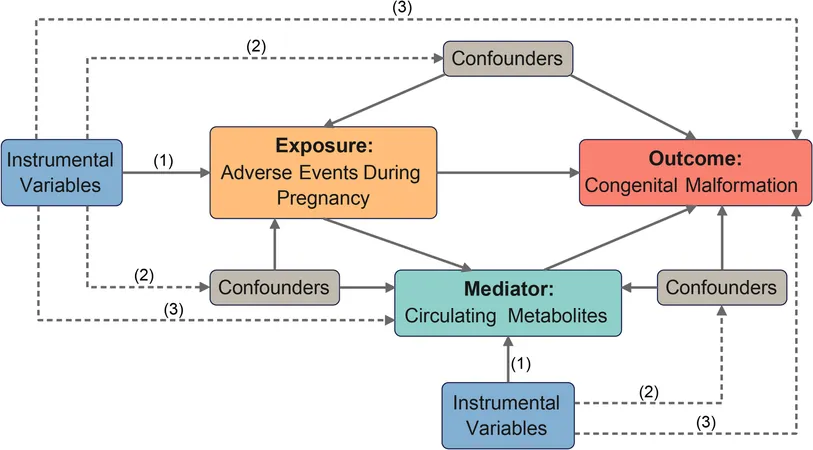
Revealing the Hidden Dangers of Pregnancy: How Adverse Events Lead to Congenital Malformations
2025-09-01
Author: Emily
The Underlying Risks of Adverse Pregnancy Events
Pregnancy can be a challenging time, with adverse events posing serious risks to fetal development. New research sheds light on how these complications can increase the likelihood of congenital malformations in offspring, highlighting gaps in current understanding of their effects.
A Groundbreaking Study: Mendelian Randomization Unlocked
In a pioneering two-sample Mendelian randomization (MR) study, researchers investigated the correlation between adverse events during pregnancy and congenital malformations. They also explored how circulating metabolites might mediate these effects, offering new perspectives on this critical area.
Startling Findings on Maternal Conditions
The study unveiled some striking relationships: maternal bleeding during pregnancy heightened the risk of congenital ichthyosis, while simultaneously reducing the chances of congenital hydrocephalus. Anemia was linked to a surge in atrioventricular septal defects, while conditions like placenta previa and placental abruption were associated with notable risks for breast malformations.
Premature Birth: A Major Contributor to Heart Defects
Premature birth turned out to be a significant risk factor, correlating with complex congenital heart defects. Interestingly, fetal malposition reduced the risk of cleft lip, while urogenital infections were tied to heart chamber malformations.
Understanding the Role of Glycine
The analysis suggested that glycine, an amino acid, could mediate about 1.1% of the impact of premature birth on the risk of complex heart defects. This insight opens the door for future research on how specific metabolites may influence fetal development.
Sophisticated Methodology: The MR Approach
Utilizing a robust two-sample MR design, this study adhered to strict assumptions to ensure accuracy. Analyses spanned two phases: assessing the initial impact of various pregnancy-related adverse events on congenital outcomes and then investigating the mediating roles of circulating metabolites.
Limitations and Future Research Directions
Despite these exciting findings, limitations exist. The MR approach assumes that genetic variants directly link to outcomes only through the exposure in question, a condition not always met. Furthermore, the study's reliance on European ancestry data raises concerns about its generalizability across diverse populations.
Conclusion: A New Dawn for Maternal-Fetal Research
This study not only reinforces existing knowledge by linking adverse pregnancy events with congenital malformations but also opens new avenues for exploration into metabolite roles. As science advances, more comprehensive research is essential to fully understand these complex interactions, ultimately improving outcomes for mothers and their children.









 Brasil (PT)
Brasil (PT)
 Canada (EN)
Canada (EN)
 Chile (ES)
Chile (ES)
 Česko (CS)
Česko (CS)
 대한민국 (KO)
대한민국 (KO)
 España (ES)
España (ES)
 France (FR)
France (FR)
 Hong Kong (EN)
Hong Kong (EN)
 Italia (IT)
Italia (IT)
 日本 (JA)
日本 (JA)
 Magyarország (HU)
Magyarország (HU)
 Norge (NO)
Norge (NO)
 Polska (PL)
Polska (PL)
 Schweiz (DE)
Schweiz (DE)
 Singapore (EN)
Singapore (EN)
 Sverige (SV)
Sverige (SV)
 Suomi (FI)
Suomi (FI)
 Türkiye (TR)
Türkiye (TR)
 الإمارات العربية المتحدة (AR)
الإمارات العربية المتحدة (AR)